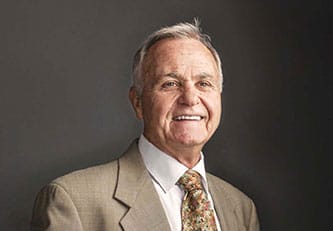The 26-year-old Arnold J. “Skip” Rosoff, W’65, received an ultimatum in 1970 from his employer, the venerable Philadelphia law firm of Wolf, Block, Schorr & Solis-Cohen LLP. He could continue to teach at Wharton or he could practice law. Not both. Rosoff had been teaching business law part time and working at Wolf Block full time since he graduated Columbia Law School and returned to Philadelphia two years earlier.
He was about to give up his beloved teaching gig when Professor Robert D. Eilers, founding director of Penn’s Leonard Davis Institute of Health Economics (LDI), made Rosoff an offer too good to refuse: He could join a Wharton team helping to draft President Richard Nixon’s National Health Insurance Plan proposal. The health insurance plan was written, Richard Nixon was re-elected and then the plan was shelved. But by then, Rosoff was ready to become a career academic and a tenure track position awaited him. The challenges of health care reform still galvanize him. As does teaching at Penn.
“I find the students so interesting,” he says. “They’re so full of hopes and dreams and promise. I like hearing from them. I pride myself on immediate answers to students’ emails. You send me an email at 12:30 p.m., you’ll likely get a response within five minutes.”
Yes, fast-forward to 2014, and Rosoff is still working at Wharton. He officially retired and became professor emeritus in July 2013, but he calls emeritus a “functionally loose term” that can mean anything from full retirement to active involvement.
“I’m on a voyage of discovery, trying to find the sweet spot on that spectrum,” he says.
“After I clear a few big items off my bucket list—like cruising the Great Loop with my wife on our powerboat in 2014—I hope to come back to do more teaching, albeit not a regular course load and get involved in various kinds of projects.”
One reason for his desire to stay involved is that the University of Pennsylvania has been his home, both intellectual and otherwise, for most of his life. He was one of the original faculty in-residence in Van Pelt College House, Penn’s first College House, from 1971 to 1973; and he served as faculty master of Fisher-Hassenfeld College House from 2000 to 2006, living in the same section of the Quad where he resided as an undergraduate in the 1960s.
Life away from Penn is hard to imagine, he says. That’s part of the reason he co-taught his regular two-course load this past fall. And the reason he is working with other Wharton health care faculty and alumni to develop content about health care business issues for Wharton’s new SiriusXM Channel 111.
Another explanation for Rosoff’s continued involvement is his high energy, apparently not limited by age or geography.
He continues as a member of the LDI executive committee and the executive committee of PASEF, the Penn Association of Senior and Emeritus Faculty, an organization that fosters the participation of long-time and retired faculty.
“PASEF has made great strides helping the University realize the full potential of one of its most valuable resources, its senior faculty,” he says.
Another good indication of how Rosoff is attacking his “retirement” is that two days before it officially began last June, he left for China to teach two five-week summer school courses at Sichuan University.
Yet one more is his beginning efforts on a book about his life, tentatively titled C.V. Borrowing a line from the Grateful Dead, one of his musical favorites, he muses, “What a long, strange trip it’s been. I want to chronicle my adventures, my insights, my incredible good fortune to start out with the sketchiest of road maps and end up in the best of all possible worlds.”
Rosoff plans to start writing in earnest, he laughs “as soon as I can find the time.”
—Lynette Hazelton, CGS’80
























